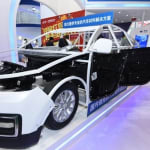 The world is shifting into high gear on sustainability. China, one of the major manufacturing countries of cars, has put emphasis on the development of energy-saving and new energy automobiles in its "Made in China 2025" strategy. According to a report in January 2018 by the China Association of Automobile Manufactures, production of new energy automobiles in 2017 amounted to 794 thousand, a year-on-year growth of 53.8%.
The world is shifting into high gear on sustainability. China, one of the major manufacturing countries of cars, has put emphasis on the development of energy-saving and new energy automobiles in its "Made in China 2025" strategy. According to a report in January 2018 by the China Association of Automobile Manufactures, production of new energy automobiles in 2017 amounted to 794 thousand, a year-on-year growth of 53.8%."Innovation is Key to the Future", theme of CHINAPLAS 2018, is architected around to call for electric, lightweight and intelligent vehicles. The show will be replete with high-tech, energy-saving and environmentally friendly solutions for automotive industry by more than 1,500 exhibitors.
The future is lightweight and energy-saving
Polymer-based composites, thanks to their lightness, strength, moldability, elasticity, corrosion resistance and weatherability, play an important role in producing lightweight vehicles. Reduction in weight, a crucial factor of new energy autos, calls for the use of composites, employing which in the making of structural parts and coverings can reduce weights by about 30%.Beijing Tiangang Auxiliary Co., Ltd. will introduce new applications of the “Targeted Nano Enhancement Technology” at CHINAPLAS 2018 for the automotive industry to achieve thin-wall and lightweight goals. The technology makes use of the special targeted release and enhancement of high performance nano particles and facilitates the nano dispersion of functional additives in polymer composites, improving a number of properties, such as higher crystallization, better mechanical properties, melt flows, processing properties and lower VOC.
DSM is a CHINAPLAS veteran and this year DSM’s Stanyl HGR2 PA46 resin will be displayed. DSM’s Stanyl HGR2 PA46 resin is powered by a 5.0L V8 engine as a drop-in replacement for PA66, providing enhanced wear and friction performance. Environmental benefits include reductions in gas consumption and green-house gas emissions. The resin has already been used in chain tensioner arms in the Ford F-150 and Mustang, and will be utilized on more vehicles beginning in 2018.
In order to achieve "green" automotive manufacturing, apart from using lightweight and higher performance alternative materials, new equipment and new processing technology do accelerate the development of automotive lightweighting and energy saving.
The EC-SXII series of all-electric injection molding machines from Shanghai Toshiba Machine Co., Ltd. is equipped with more advanced injection capability compared to the previous EC-SX series. The machines are expected to better meet customer needs for precision molding and higher productivity. The series is able to adapt from thin-wall to thick-wall molding, offering greater flexibility to users.
MuCell injection is an innovation of precision injection molding technology, which significantly reduces the weight of the parts and shortens molding cycle, improving the buckling deformation of parts and dimensional stability. In recent years, with the development of automotive lightweighting, MuCell is widely used in the automotive industry. The Mucell instrument panel mould of Zhejiang Kaihua Moulds Co., Ltd. takes injection molding production to a new level of automation, enhancing productivity.


